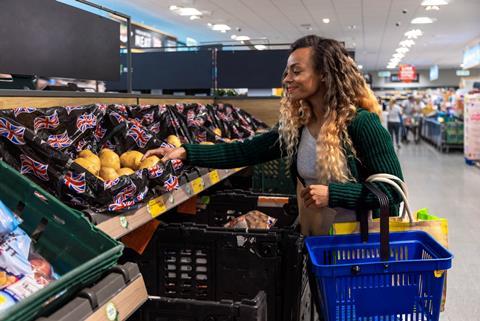
Top story
Strong food sales in the run-up to this year’s early Easter boosted UK retail sales in March, though non-food sales continued to decline.
According to the BRC-KPMG Retail Sales Monitor, UK total retail sales were up by 3.5% year on year in March to build on growth of 5.1% in the same month in 2023.
Food sales increased 6.8% year on year over the three months to March, against growth of 8.5% in March 2023.
For the month of March, food was in growth year on year.
Non-food sales fell back 1.9% year on year over the three months to March, against growth of 1.8% in March 2023, and the category was in decline in the month of March.
In-store non-food sales over the three months to March decreased 1.1% year on year, against growth of 5.2% in March 2023.
Online non-food was down 1.4% compared to a 2.1% decline in March 2023, with the online non-food penetration rate down to 36.6% from 36.8%.
BRC CEO Helen Dickinson said: “While retail sales growth improved last month, this was largely driven by Easter falling unusually early and the subsequent uplift to food sales in the week preceding the long weekend. Easter also boosted sales of non-food products such as cookware and tableware, as people readied themselves to host family and friends. Home textiles such as throws and pillows were also popular as consumers sought to spruce up their homes ahead of spring. Elsewhere, wet weather dampened sales of garden furniture, barbecues, DIY products, and clothing and footwear.
“After a difficult start to the year, retailers are hopeful that with warmer weather around the corner, consumer confidence will spring back up. A strong retail industry can boost investment across our towns and cities, and as we gear up for a general election, it is essential the next government recognises this and rethinks the burdensome costs imposed on retailers. With a pro-growth policy landscape, retailers can step up their investment in innovation and in local jobs and communities up and down the country.”
Linda Ellett, UK head of consumer markets, leisure & retail, KPMG, added: “An early Easter showed green shoots of spring for retailers in March, with sales growth up a more positive 3.5% on last year, and above headline inflation for the first time in more than two years.
“High street sales growth was driven by food and drink, health and beauty and keen gardeners who headed outside to enjoy the first days of spring. There were also some signs of improvement with more categories starting to see positive sales growth in March for the first time in months. Online sales, however, continued to slide, falling by 1.4% despite strong performances in home accessories, health, beauty, and homewares.
“As April signals big increases in the sector’s cost base – through the rise in minimum wage rates and business rate hikes for the larger high street brands – retailers will be hoping that the bounceback of March sales is more than just an Easter blip. Economic indicators are heading in the right direction with inflationary pressures easing and interest rates having potentially peaked, however consumer confidence remains fragile, and households continue to keep a close eye on where their tight budgets are being spent. It remains a challenging environment, but as we head into the warmer months, retailers will be hoping that stronger consumer confidence will turn into stronger retail sales, especially in more discretionary categories such as clothing, following an incredibly difficult few years.”
IGD CEO Sarah Bradbury said: “The UK grocery market benefitted from Easter falling in March this year. This has led to very positive comparisons with spending increasing on March 2023, and importantly significant volume growth. This marks the fourth consecutive month of year-on-year volume growth, offering hope to retailers and suppliers of finally being able to regrow margins that have shrunk during the cost of living crisis.
“Shoppers faced a multitude of financial changes this month from the anticipation of ‘price hike Monday’ to the budget announcement that cut National Insurance for the second time in six months. At a total level, shoppers have a growing confidence in their financial outlook, however the strength of this growth varies by household income. For lower income households, confidence is growing at a slower rate despite news of an almost 10% increase to the national living wage. For all shoppers, we expect the cautious approach to continue as cost of living challenges remain.”
Morning update
Imperial Brands has said it remains on track to meet half-year and full-year guidance as it has maintained tobacco share and grown next-generation product (NGP) sales.
It said it has made “good progress” implementing its five-year strategy to transform the business and is confident it will deliver the full-year accelerated adjusted operating profit growth in line with our previously stated guidance.
For the full year, on a constant currency basis, tobacco and NGP net revenue is expected to grow at a low single-digit rate, with group adjusted operating profit growing at a rate close to the middle of its mid-single-digit range.
This performance reflects “improved resilience to withstand geopolitical and macro-economic pressures as well as the benefit of continued investment to strengthen performance”.
Constant currency tobacco and NGP net revenue growth has strengthened over the same period last year, underpinned by strong combustibles pricing and growth in its NGP business.
In combustibles, focused investment in our five priority markets continued to support resilient aggregate market share with gains in the US, Spain and Australia, broadly offsetting declines in Germany and the UK, as expected.
NGP first half net revenues are expected to grow in the mid to high teens at constant currency, and the company is now present in more than 20 European markets and the US.
NGP gross margins are improving as it builds scale and it is reducing NGP operating losses alongside continued investment.
Second half delivery will be underpinned by embedded tobacco pricing already taken in the first half and further NGP growth as it builds scale, and associated margin benefits.
Elsewhere this morning, consumer card spending growth flatlined in March, on par with February’s modest 1.9% uplift and significantly less than the latest CPIH inflation rate of 3.8%, according to data from Barclays.
This was largely due to a slowdown in non-essential spending, which saw its smallest increase (1.6%) since September 2022, as wet weather dampened both retail and restaurant sales.
Retail spending remained almost flat at 0.7%, brought down by falling in-store spending. Face-to-face retail (excluding groceries) was down 2.1% and clothing fell 1.8%, as spring showers deterred shoppers from visiting the high street.
Meanwhile, restaurants had another challenging month, down 12.6%, consistent with the fall witnessed in February (13.4%).
After reaching its highest point since November 2021 in February (59%), consumers’ confidence in their ability to spend on non-essential items slipped to 55% in March.
Pubs, bars and clubs saw stronger growth than in February, at 3.2% compared to 1.1%, as punters gathered to watch Six Nations and FA Cup fixtures, and to celebrate St Patrick’s Day.
Spending on essential items grew 2.4%, close to February (2.3%). This was propped up by a noticeable recovery in fuel (–7.1%) compared to February (–12.2%) owing to petrol and diesel price increases.
Grocery spending, up just 2.7%, recorded its slowest growth since September 2022 due to falling food price inflation, which reached its lowest level (5.0%) since January 2022. Despite this, concerns about general inflation have risen to 87%, after hitting a record low last month (84%).
Consumers are also increasingly concerned about the impact of shrinkflation, at 80% versus 78% the previous month.
Karen Johnson, head of retail at Barclays, said: “Retailers were braced for a more subdued start to 2024, and recent figures are in line with expectations. The wet weather has been a key factor in the slowdown in discretionary spending, as it’s meant fewer visits to the high street and to hospitality venues.
“However, in spite of this initial lull, many retailers are confident that spending will rebound in the coming months, particularly in anticipation of better weather, the energy price cap drop, an uplift in the national minimum wage, and the buzz around major events such as Taylor Swift’s Eras Tour and the Paris 2024 Olympics.”
Jack Meaning, chief UK economist at Barclays, said: “While still only tentative, the signs that the UK economy is expanding into 2024 continue to build. With an expectation that the Bank of England will cut interest rates from June, and banks responding by reducing mortgage rates, our research suggests the housing costs that have been a drag on consumers for over a year are on the cusp of a turn, and will become a boost to spending from H2 and beyond. Today’s data shows this transition happening in real time.”
Listed consumer products group Ultimate Products saw revenue decline by 4% to £84.2m in its financial year to 31 January.
Supermarket ordering was held back by overstocking issues (which are now easing), with strong prior year comparatives bolstered by the exceptionally strong demand for energy-efficient air fryers in the first half 2023.
Gross profit rose 3% to £22.4m, with gross margin increasing to 26.6%, driven by sales mix and the fall in global shipping rates.
Adjusted EBITDA was stable at £11.3m and statutory profit before tax was up 2% to £9.5m as lower net debt reduced finance expenses.
The Group continues to trade in line with market expectations for 2024, it said.
CEO Andrew Gossage commented: “This has been another period of resilient performance for Ultimate Products. Macro conditions remain challenging, but our strategy of providing beautiful products at mass-market prices to UK and European households is continuing to stand us in good stead.
“We are now seeing the gradual resumption of normal ordering patterns from our customers after the overstocking issues that were brought about by the pandemic, and we have a range of initiatives underway to improve operational efficiencies and deepen our customer relationships. As a result, we continue to trade in line with market expectations.”
On the markets this morning, the FTSE 100 has edged up to 7,949.2pts.
Risers include Naked Wines, up 1.8% to 58.3p, Tate & Lyle, up 1.5% to 615.6p and PayPoint, up 1% to 488.5p.
Fallers include SSP GRoup, down 2% to 216.2p, Ocado, down 1.5% to 369.7p and McBride, down 1.4% to 104.5p.
Yesterday in the City
The FTSE 100 opened the week on the front foot, rising 0.4% to 7,943.4pts.
The day’s risers included THG, up 8.8% to 66p, Fever-Tree Drinks, up 5.2% to 1,158p, Hilton Food Group, up 2.4% to 886p, Deliveroo, up 1.5% to 131p, C&C Group, up 1.5% to 166.8p and Nichols, up 1.4% to 994p.
Fallers included McBride, down 13.8% back to 106p, Kerry Group, down 2% to €77.60, Just Eat Takeaway.com, down 1.9% to 1,244p and Marks & Spencer, down 1.8% to 256.5p.







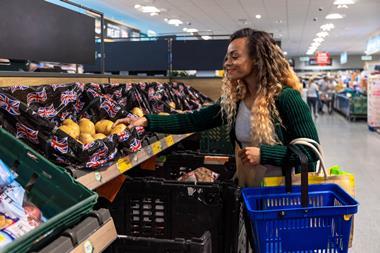
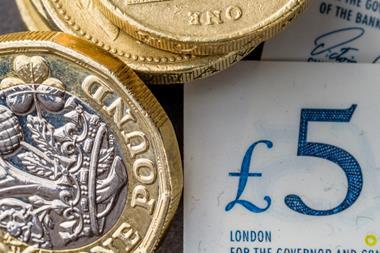
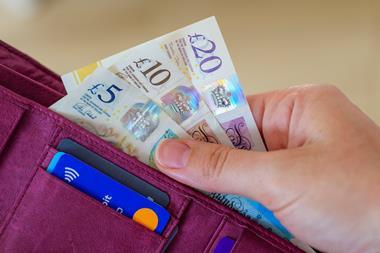
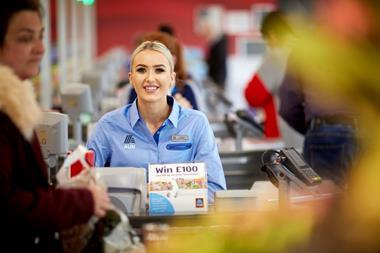
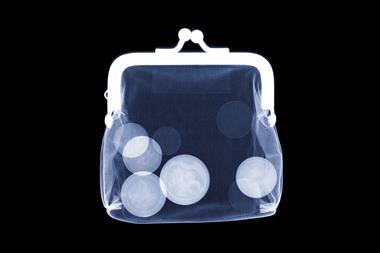
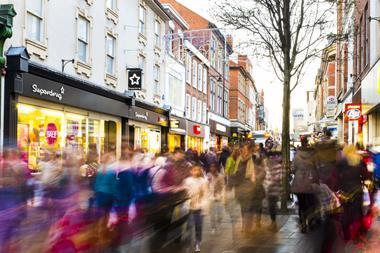






No comments yet